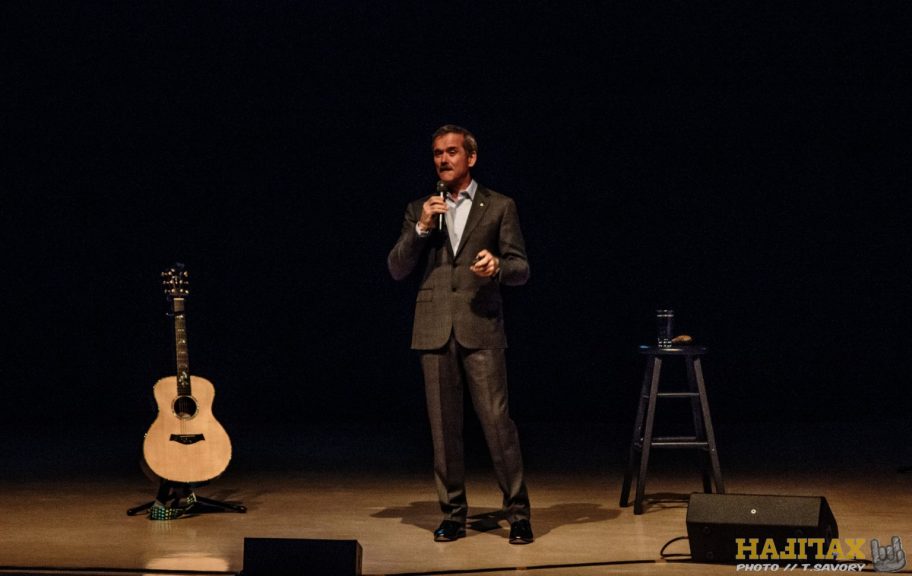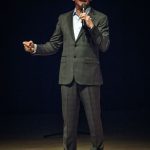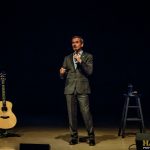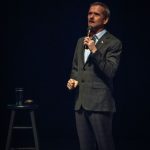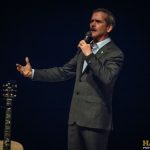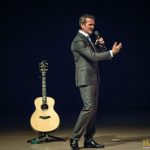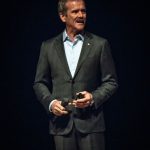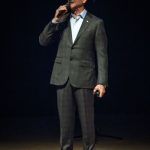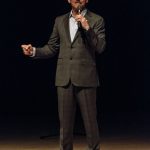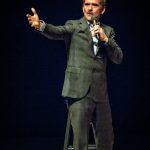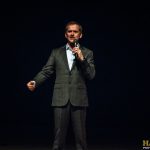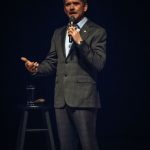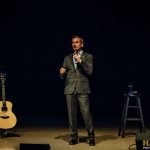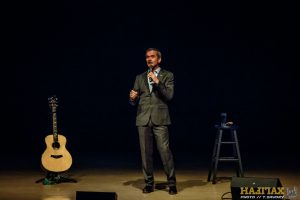 The opportunity to sit in a room and listen to a presentation from an actual astronaut doesn’t present itself very often, and when you get the chance to partake in such an experience, you leap at it. This was the choice that the roomful of Rebecca Cohn patrons made this past Thursday evening. Part Ted Talk, part social studies/world history class, but entirely enthralling, Commander Chris Hadfield held the sold-out crowd in the palm of his hand for 3 hours as he spoke about the origins of Canada, mankind, the rings of Saturn, as well as heroic Canadians. Of course, there was the obligatory talk of his time aboard the International Space Station (and some of the time he spent outside of it).
The opportunity to sit in a room and listen to a presentation from an actual astronaut doesn’t present itself very often, and when you get the chance to partake in such an experience, you leap at it. This was the choice that the roomful of Rebecca Cohn patrons made this past Thursday evening. Part Ted Talk, part social studies/world history class, but entirely enthralling, Commander Chris Hadfield held the sold-out crowd in the palm of his hand for 3 hours as he spoke about the origins of Canada, mankind, the rings of Saturn, as well as heroic Canadians. Of course, there was the obligatory talk of his time aboard the International Space Station (and some of the time he spent outside of it).
Hadfield commanded the room, and he paced back and forth at times, drawing our attention to the two screens suspended aloft. He used these screens to great effect, giving us a first-hand view of a massive solar flare, or allowing us to have a glimpse of what it was like to surf the northern lights, thanks to a breathtaking video taken from the I.S.S.. It was moments like these that provided the perspective of just how infinitely small we truly are in the grand scheme of the universe. It was also interesting to hear an astronaut liken the early sailing vessels to spacecraft, as both were venturing off into the relative unknown, making little more than an educated guess of what they would find.
At about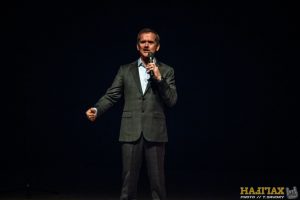 the 1-hour mark, Hadfield brought up the house lights and opened the floor up to questions. It was a great treat to hear him field questions from the audience; one in particular had Hadfield’s mouth watering as he reminisced about space burritos. In vivid detail he described the little puff of air that the tortillas released before floating out unencumbered like a tiny flying saucer. A little PB and honey on the surface of the flour UFO makes for a delicious recollection that he does indeed miss.
the 1-hour mark, Hadfield brought up the house lights and opened the floor up to questions. It was a great treat to hear him field questions from the audience; one in particular had Hadfield’s mouth watering as he reminisced about space burritos. In vivid detail he described the little puff of air that the tortillas released before floating out unencumbered like a tiny flying saucer. A little PB and honey on the surface of the flour UFO makes for a delicious recollection that he does indeed miss.
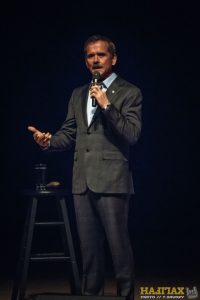 The other interesting declaration that Col. Hadfield made prior to the intermission was the fact that he believes the next logical step in space exploration would involve a lunar base. We as a species have already left the planet and are living comfortably on-board the International Space Station. Much like early Thinking Humans (aka Homosapiens), who continually pushed the literal boundaries to forge a better life for their progeny, we are a legion of visionaries working toward propagation of our species. We hardly get it right on the first attempt, but through perseverance and determination (maybe a little “Grace, Too”), we eventually succeed.
The other interesting declaration that Col. Hadfield made prior to the intermission was the fact that he believes the next logical step in space exploration would involve a lunar base. We as a species have already left the planet and are living comfortably on-board the International Space Station. Much like early Thinking Humans (aka Homosapiens), who continually pushed the literal boundaries to forge a better life for their progeny, we are a legion of visionaries working toward propagation of our species. We hardly get it right on the first attempt, but through perseverance and determination (maybe a little “Grace, Too”), we eventually succeed.
After a short intermission, we return to hear Hadfield regale us with the tale of Bartholomew, who in 1487 was the first to sail around the Southern tip of Africa, and opened a lucrative gateway to a land of foreign spices. In paving the way to Asia, many scoffed at the duration these trips took and set out to chart their own course in an efficiency effort. Both of these ambitious explorers (Cabot and Columbus) failed to reach the Asian world and ended up inadvertently discovering the Americas. More stories which highlight the fact that, without perseverance and ingenuity, we as a species may have met a premature end.
That was ultimately what many in attendance took away from the presentation, the fact that it is not what has already happened, and instead what we do next, that is important. It was a soul-nourishing revelation, in the fact that, while life happens, it is those next steps that inform who we are and where we are headed. The presentation then shone a light on two important women: Laura Secord, who played a pivotal role in aiding the proto Canadian army by being forced to house and serve invading US troops, during which time she actively took notes on their discussions, which she delivered one evening to nearby proto Canadian forces after hiking 20 miles in the dead of night, which allowed a Canadian counterattack that turned the tide of war. The other was Mona Parsons, a girl who wanted nothing more than to be a flapper girl, and studied acting, then 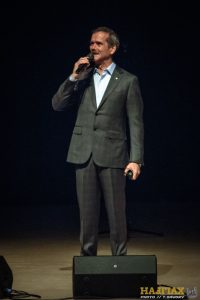 became a nurse. She then relocated to the big city and met a gentleman whom she eventually married. As he was from Holland, they eventually moved there just prior to Hitler’s invasion. She provided refuge and a path to freedom for allied soldiers and was eventually found out and landed in a POW camp until the end of the war, when she escaped, weighing a scant 86 lbs, in the winter. The first allied soldiers she encountered were the NS Highlanders, some of whom she attended school with. Eventually, Mona moved back to Nova Scotia and married her childhood sweetheart. These harrowing tales are just two remarkable stories of those next steps, which truly mattered.
became a nurse. She then relocated to the big city and met a gentleman whom she eventually married. As he was from Holland, they eventually moved there just prior to Hitler’s invasion. She provided refuge and a path to freedom for allied soldiers and was eventually found out and landed in a POW camp until the end of the war, when she escaped, weighing a scant 86 lbs, in the winter. The first allied soldiers she encountered were the NS Highlanders, some of whom she attended school with. Eventually, Mona moved back to Nova Scotia and married her childhood sweetheart. These harrowing tales are just two remarkable stories of those next steps, which truly mattered.
Three hours breezed by in an informative and enlightening session. It made me honestly wonder why no one has yet backed up a Brinks truck to the Colonel’s door and created an entire school science and history curriculum; he could easily be Canada’s answer to Bill Nye. The evening’s presentation easily could have gone another hour or two, and very few would have complained. The room was packed with young and old alike, all of whom wanted to spend their evening listening to one of Canada’s most interesting and intelligent sons. Colonel Hadfield explained that in meeting David Bowie, he was everything you wanted him to be, and closed out the night with his retooled and beloved version of the David Bowie classic “Space Oddity”.





